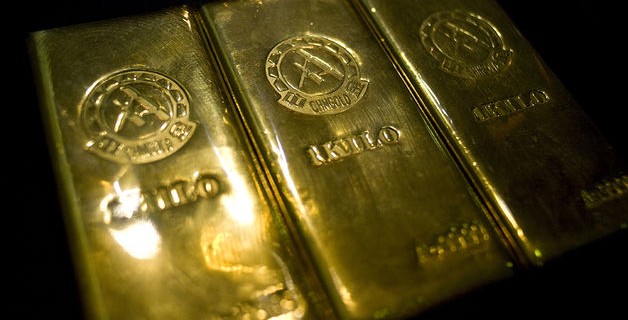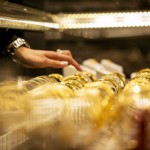China Finds $15B of Loans Backed by Falsified Gold Trades

China’s chief auditor discovered 94.4 billion yuan ($15.2 billion) of loans backed by falsified gold transactions, adding to signs of possible fraud in commodities financing deals.
Twenty-five bullion processors made a combined profit of more than 900 million yuan by using the loans to take advantage of the difference between onshore and offshore interest rates, and the appreciation of Chinese currency, according a report on the National Audit Office’s website. China is the biggest producer and consumer of gold.
Public security authorities are also probing alleged fraud at Qingdao Port where the same stockpiles of copper and aluminum may have been pledged multiple times as collateral for loans. As much as 1,000 tons of gold may be tied up in financing deals in China, in which commodities including metals and agricultural products are used to get credit amid restrictions on lending, according to World Gold Council estimates through 2013.
“This is the first official confirmation of what many people have suspected for a long time — that gold is widely used in Chinese commodity financing deals,” said Liu Xu, a senior analyst at Capital Futures Co. in Beijing. “Any scaling back by banks of gold-backed financing deals might lead to a short-term reduction in Chinese imports and also spur some sales by companies looking to repay lenders.”
Gold Price
Gold traded below a two-month high today as investors weighed the outlook for the U.S. economy that shrank in the first quarter by the most in five years.
Bullion for immediate delivery traded at $1,316.70 an ounce by 1:07 p.m. Beijing time from $1,319.18 yesterday, according to Bloomberg generic pricing. The metal climbed to $1,325.95 on June 24, the highest level since April 15.
The global flow of gold from west to east that’s helped to make China the world’s largest user will probably last for as long two decades as rising incomes spur demand, according to the China Gold Association.
Mark To, head of research at Wing Fung Financial Group in Hong Kong, said the audit office’s report is unlikely to have a significant impact on the underlying demand for gold in China.
Steps by the Chinese government to rein in credit and inflation by raising borrowing costs since 2010 created a surge in the use of commodities as a means of getting access to cash from abroad.
Goldman Estimate
These deals are worth $81 billion to $160 billion, according to projections by Goldman Sachs Group Inc., accounting for as much as 31 percent of the nation’s short-term, foreign currency loans.
The National Audit Office’s report was delivered by its chief, Liu Jiayi, at a National People’s Congress meeting June 24 and posted on the office’s website. The report covers a period beginning in 2012 and doesn’t specify an end date. It doesn’t identify companies or banks.
An official in the media department of the audit office asked for inquiries to be faxed when contacted today. There was no immediate response to faxed questions.
The investigation at Qingdao focuses on a company called Decheng Mining and its owner, Singaporean national Chen Jihong, according to two bankers assisting with the probe by public security officials. Jihong has been detained, according to Singapore’s foreign ministry. He is also involved in a separate inquiry in northwestern Gansu province, said the bankers, who asked not to be identified because they’re not authorized to speak publicly.
Qingdao Probe
Local lenders and foreign banks including Standard Chartered Plc, Citigroup Inc. and Standard Bank Group said they are reviewing potential fallout from any lending linked to Qingdao.
The Chinese agency that stockpiles strategic commodities is checking to ensure its copper purchases are free of collateral risks while the customs authorities issued new rules to help prevent goods being pledged multiple times as collateral, people with direct knowledge of these matters said previously.
Source: bloomberg



























